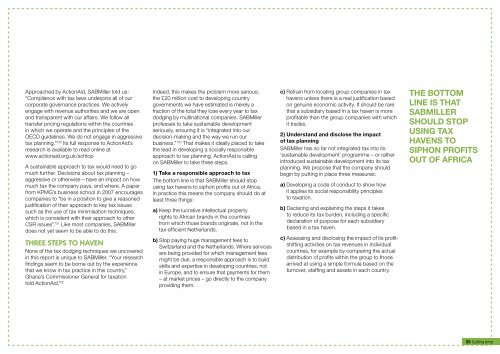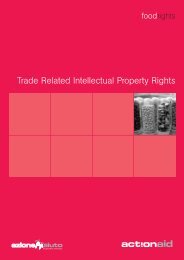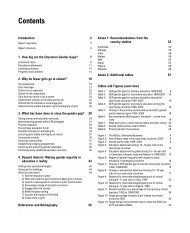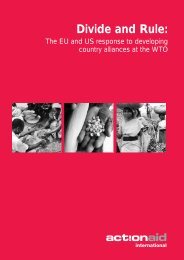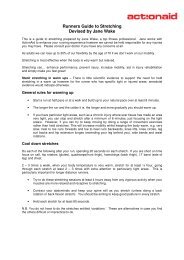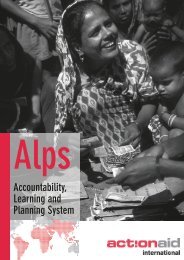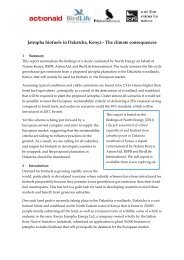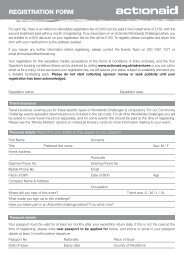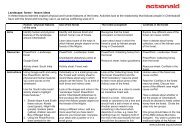You also want an ePaper? Increase the reach of your titles
YUMPU automatically turns print PDFs into web optimized ePapers that Google loves.
Approached by <strong>ActionAid</strong>, SABMiller told us:<br />
“Compliance with tax laws underpins all of our<br />
corporate governance practices. We actively<br />
engage with revenue authorities and we are open<br />
and transparent with our affairs. We follow all<br />
transfer pricing regulations within the countries<br />
in which we operate and the principles of the<br />
OECD guidelines. We do not engage in aggressive<br />
tax planning.” 130 Its full response to <strong>ActionAid</strong>’s<br />
research is available to read online at<br />
www.actionaid.org.uk/schtop<br />
A sustainable approach to tax would need to go<br />
much further. Decisions about tax planning –<br />
aggressive or otherwise – have an impact on how<br />
much tax the company pays, and where. A paper<br />
from kPMG’s business school in 2007 encourages<br />
companies to “be in a position to give a reasoned<br />
justification of their approach to key tax issues<br />
such as the use of tax minimisation techniques,<br />
which is consistent with their approach to other<br />
CSR issues”. 131 Like most companies, SABMiller<br />
does not yet seem to be able to do this.<br />
three steps to haven<br />
None of the tax dodging techniques we uncovered<br />
in this report is unique to SABMiller. “Your research<br />
findings seem to be borne out by the experience<br />
that we know in tax practice in this country,”<br />
Ghana’s Commissioner General for taxation<br />
told <strong>ActionAid</strong>. 132<br />
Indeed, this makes the problem more serious:<br />
the £20 million cost to developing country<br />
governments we have estimated is merely a<br />
fraction of the total they lose every year to tax<br />
dodging by multinational companies. SABMiller<br />
professes to take sustainable development<br />
seriously, ensuring it is “integrated into our<br />
decision-making and the way we run our<br />
business.” 133 That makes it ideally placed to take<br />
the lead in developing a socially responsible<br />
approach to tax planning. <strong>ActionAid</strong> is calling<br />
on SABMiller to take three steps.<br />
1) Take a responsible approach to tax<br />
The bottom line is that SABMiller should stop<br />
using tax havens to siphon profits out of Africa.<br />
In practice this means the company should do at<br />
least three things:<br />
a) keep the lucrative intellectual property<br />
rights to African brands in the countries<br />
from which those brands originate, not in the<br />
tax-efficient Netherlands.<br />
b) Stop paying huge management fees to<br />
Switzerland and the Netherlands. Where services<br />
are being provided for which management fees<br />
might be due, a responsible approach is to build<br />
skills and expertise in developing countries, not<br />
in Europe, and to ensure that payments for them<br />
– at market prices – go directly to the company<br />
providing them.<br />
c) Refrain from locating group companies in tax<br />
havens unless there is a real justification based<br />
on genuine economic activity. It should be rare<br />
that a subsidiary based in a tax haven is more<br />
profitable than the group companies with which<br />
it trades.<br />
2) understand and disclose the impact<br />
of tax planning<br />
SABMiller has so far not integrated tax into its<br />
‘sustainable development’ programme – or rather<br />
introduced sustainable development into its tax<br />
planning. We propose that the company should<br />
begin by putting in place three measures:<br />
a) Developing a code of conduct to show how<br />
it applies its social responsibility principles<br />
to taxation.<br />
b) Declaring and explaining the steps it takes<br />
to reduce its tax burden, including a specific<br />
declaration of purpose for each subsidiary<br />
based in a tax haven.<br />
c) Assessing and disclosing the impact of its profitshifting<br />
activities on tax revenues in individual<br />
countries, for example by comparing the actual<br />
distribution of profits within the group to those<br />
arrived at using a simple formula based on the<br />
turnover, staffing and assets in each country.<br />
The boTToM<br />
lIne IS ThAT<br />
SAbMIlleR<br />
ShoulD SToP<br />
uSIng TAx<br />
hAvenS To<br />
SIPhon PRofITS<br />
ouT of AfRICA<br />
35 <strong>Calling</strong> time


